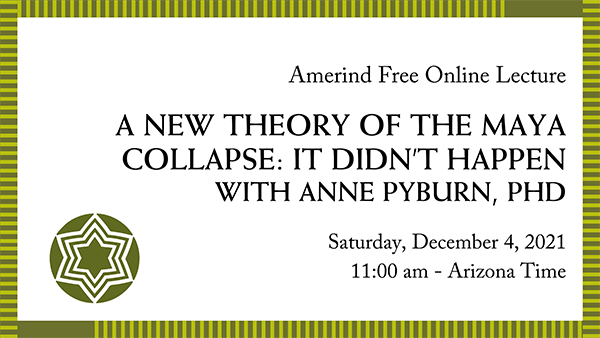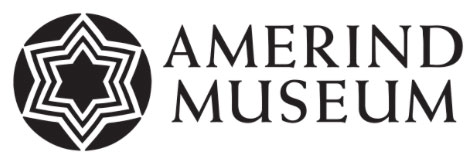
Amerind Free Online Lecture – A New Theory of the Maya Collapse: It Didn’t Happen with Anne Pyburn, PhD
Saturday, December 4, 2021, 11:00 am – Arizona Time
In an attempt to make their work relevant to the present and supportive of valuable political understandings, archaeologists have often tried to interpret their findings as providing “lessons from the past.” Usually these have something to do with a concern for the results of overpopulation or environmental destruction in the present. Many have assumed that showing how human error in the past led to starvation, suffering and collapse would impel people in the present to make better choices.
The results of these efforts have been negligible for social change, but unfortunately, constructing the ancestral cultures of Indigenous groups as wasteful, violent, political failures has had demonstrable negative consequences. This is particularly the case for living Maya people whose plight in the world today continues to be ignored, as their history is continuously used as a cautionary tale for humanity. People are shocked to learn that there are over eight million Maya speakers alive today, many of whom are still struggling to overcome the genocide of the Guatemalan civil war.
In this talk Anne Pyburn, PhD will cast the history of Maya speaking peoples in a different light and turn the “lessons from the past” upside down to expose the brilliant, creative, highly developed civil society, and astonishing sustainable economic strategies of Maya cultures. She will show how a well-intentioned misrepresentation of the past has not only undermined Maya sovereignty in the present but is teaching exactly the wrong lessons from the past. The “Maya collapse” lessons are not only inaccurate, they miss the points about resilience and land rights that could have real impact on the modern world, by challenging the history of the destructive forces that are made to seem inevitable in traditional archaeological stories about the Maya past.
Anne Pyburn is Provost’s Professor of Anthropology at Indiana University Bloomington, and she holds her degrees from the University of Arizona, Tucson (Ph.D. and M.A.), and Reed College (B.A.). Her geographic areas of specialization are Mesoamerica (Belize) and Central Asia (Kyrgystan), with research interests that include archaeology, settlement patterns, the Maya, gender, ethics, as well as archaeology and social content. She is the Director of the Belize Service Learning Project for Wells Scholars, and Co-Director of the research project at Aygergel II, Naryn, Kyrgyzstan. She has written and presented widely, and her published works include “Collision or Collaboration: Archaeology Encounters Economic Development” (co-editor with P.G. Gould).
This Online program is free, but space is limited. To register visit: https://bit.ly/AmerindOnline120421

